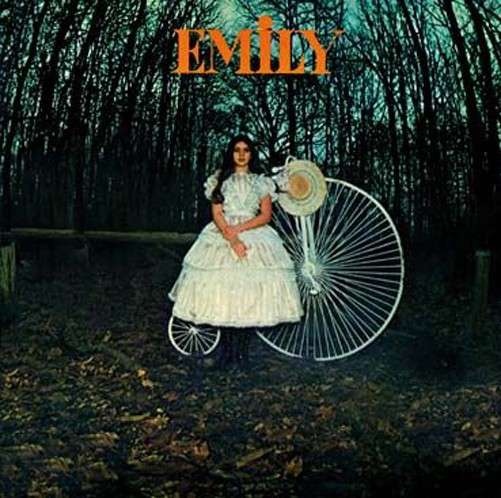|
Give this album a listen and you'll hear a sixteen-year-old kid named Emily Bindiger singing her heart out. She's got a big talented voice for someone so young, and it's obvious that the record producers were trying to play this up when they stood her next to a big old Penny Farthing bicycle for the album cover photo. But there's more than that in here, hinted at by the imagery of the little girl all in white standing in the dark woods. Emily Bindiger sings her heart out, but it's what she's singing that really draws me in.
The album has been described as Christian Psych - a subgenre of music coming out of the Psych / Acid Rock / Folk music of the 60s and 70s. But if it is Christian Psych, it's certainly an outlier. Bindiger was a student at NYC's High School of Performing Arts when she auditioned for and got a role in an international show in Paris, France in 1971. She dropped out of school and moved to Paris and brought along with her the folk songs she had been writing and performing in Greenwich Village clubs. A French record producer, hearing her perform, then teamed Emily up in the studio with the newly signed band, Dynastie Crisis, who were a short-lived but hugely influential French band. They played Pop / Rock with tons of versatility and Psych was one the kinds of music they knew how to make.
Not all of Bindiger's songs are explicitly Christian. In fact, even the Christian songs aren't what you would expect - there's no praise or worship music here, and no toeing the doctrinal line - instead these songs, written by a kid, struggle in a very mature way with questions of faith - redemption, forgiveness, the coming of age into disillusionment. Bindiger doesn't shy away from the hard stuff. The album's first track "Confession" opens with the lyrics: "Father, Father, how I have sinned. Father, you know where I've been. My eyes are burning and I'm losing my mind. Father, Father, please be kind." With french horn and flutes playing along, the song becomes a sort of bold mix of prayer and confusion, confession and folk journey. The next song, "Sunflower Seeds," bounces along like a country-pop crossover. It's short and sweet, but the lyrics are about sunflower seeds that aren't growing and are in danger of being lost in the change of the seasons. The tension really begins to sprout by the third track, "Jesus Said," in which Bindiger sings about about witnessing sorrow, but also seeing joy, and then telling us that Jesus will love us all and deliver us from pain. In the middle of the song, they bring it down and Bindiger asks frank questions of "the children" and what it is that their elders have had to give up. By this point, you'll begin to realize you're not listening to a teenager trying to teach you rote doctrine or dogma through music. Nor is she trying to overthrow or dismiss religious notions. Instead, standing on the cusp of adulthood, far away from home, with a big band behind her, she's singing out the big questions of faith. These are the kind of questions that exist inside of us more as feelings than as words. The kinds of questions that settle down on us especially at crossroads and initiations, when we realize we must leave something of ourselves behind to move forward and we feel grief even as we rush forward. That's what I hear in this album, and it continues through the next five tracks. Dynastie Crisis does an amazing job putting all this to music - bold and dreamy, orchestral and improvisational. You can buy the rereleased, remastered version on itunes.
0 Comments
Leave a Reply. |
Jesus the ImaginationThoughts and dreams, musings and meditations Archives
June 2024
Categories
All
|

 RSS Feed
RSS Feed